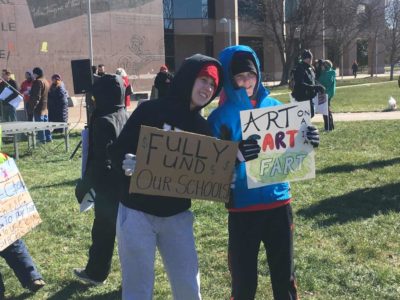
Less than two weeks into 2018, the General Assembly gathers again for a special session.
With the session starting tomorrow, and the joint legislative education oversight committee meeting today, we take a look at the biggest education issues of 2017 and examine how they will continue to affect the state in 2018.
Class size controversy
Many are calling on lawmakers to fix the class size controversy this week. But both Representatives Craig Horn, R-Union, and Jeffrey Elmore, R-Wilkes, have said that is unlikely.
The issue can be traced back to 2016. During the short session of the General Assembly that year, legislators mandated class size restrictions in grades K-3 in an effort to keep those pivotal class sizes low. The reasoning behind that change and the problems it causes are complicated and covered extensively in this explainer.
In the 2017 long session, districts around the state were upset about the new rules. They said that new restrictions effectively meant they would have to eliminate extracurricular teachers in subjects like music, art, and physical education. Meanwhile, the increase in classes that would be required by the restrictions meant that districts around the state would need to scramble for extra space in schools. This could mean the addition of trailers or other building facilities. Because districts pay for those kinds of upgrades, they argued the class size restrictions amounted to an unfunded mandate.
In the short session, the House tried to reduce restrictions with House Bill 13. But on the Senate side, lawmakers transformed it. The version that passed only delayed the harshest restrictions for a year, meaning that districts got a reprieve for the 2017-18 school year, but would face the full brunt of the change in the 2018-19 school year.
Future
Going into 2018, many are clamoring for a resolution to the chaos. A group of parents, educators, and others gathered at the General Assembly Saturday to protest the requirements, and Governor Roy Cooper publicly called on lawmakers to fix the problem. Meanwhile, some lawmakers are skeptical about districts’ claims that the class size restrictions will really impact the retention of extracurricular teachers and are waiting until they can see data proving districts’ claims. Horn has said that lawmakers will likely tackle the problem before the short session in the spring, giving a possible estimate of February or March.
Legal strife between Superintendent Mark Johnson and the State Board of Education
The dispute began in 2016 on this issue, too. First, Republican Mark Johnson beat longtime Superintendent June Atkinson, a Democrat, to gain the top education job in the state. Then, a special session held by the General Assembly in December attempted to rearrange the responsibilities held by the superintendent post. House Bill 17 transferred some of the powers held by the State Board of Education to Superintendent Mark Johnson.
The State Board did not waste much time expressing its displeasure with the General Assembly’s actions from the special session. It voted to sue the state over House Bill 17 late December 2016, sparking a legal battle that lasted all of 2017 and will continue into 2018.
The State Board and Superintendent Johnson had their day in court, meeting before a three-judge panel to give their arguments. The panel ruled for Johnson.
A stay in the transfer of powers remained in place while the two sides tried to come to some sort of agreement. When that failed, the State Board petitioned and won a further stay while they waited for appeal.
Finally, the state’s Supreme Court agreed to hear the case.
Future
The Supreme Court is slated to hear the case, and the State Board retains the powers it had prior to House Bill 17. Meanwhile, tension between the State Board and Johnson is evident in almost every State Board of Education meeting.
Principal pay raise
Lawmakers tackled the dysfunctional principal salary schedule during the 2017 long session. The problems with the salary schedule were covered extensively at EducationNC. The new salary schedule created during the short session meant pay raises for most principals, and it also reformed the way principals were paid. Instead of relying on a step schedule that took into account number of teachers supervised, principals’ educational attainment, and years of experience, the new salary schedule used size of the student population and growth metrics to determine how much a principal could be paid. Principals would get a base salary according to the size of their school and could receive additional funds depending on whether their students met or exceeded growth.
The controversy arose because some principals could receive less than they did before under the new pay schedule. As a stopgap, legislators included a hold harmless provision to allow principals who would receive less under the new schedule remain at their previous salary. The hold harmless provision only lasts for the 2017-18 school year. As districts start looking to the 2018-19 school year, they worry they would have trouble retaining principals who could be facing a pay drop after the hold harmless expires.
Future
Legislators are aware of the problems, and some districts hope the General Assembly will tackle the hold harmless provision during the short session this spring or before.
Principals may see estimates of their pay, how it differs this year from last year, and how much it will differ next year using our principal pay calculator.
Innovative School District
The Innovative School District (ISD) stems from legislation passed during the 2016 short session of the General Assembly. At its heart, the law created a “district” that would be composed of five of the lowest performing schools in the state. The schools would be run under one superintendent, would be given charter flexibility, and could be run by for-profit charter or education management organizations.
The ISD was meant to be a pilot program phased in over a number of years. Last year, 2017, a superintendent was hired, two inaugural schools were selected to join the ISD, and management organizations to run them were identified.
Over the summer, Eric Hall, head of Community in Schools of North Carolina, was tapped to be the superintendent. He began by generating a list of potential schools to join the ISD. Some districts with schools on the list were quick to push back against their inclusion. Durham parents, in particular, fought hard when schools in their district made the short list. Ultimately, Hall only chose one school in Robeson County, Southside Ashpole Elementary School, to launch the project. The State Board of Education approved the choice.
But Robeson County has not made a decision as to whether its school will join the ISD or whether district leaders will simply close it down. The school board is slated to decide today.
Meanwhile, two management organizations have thrown their hats in the ring to run the school.
Future
If Robeson County refuses to let its school join the ISD and closes it instead, Hall will start over in school selection in the fall. If the board agrees to allow Southside Ashpole to be the inaugural ISD school, then the process of choosing a management organization continues, and the final choice will be made shortly into the new year.
Leandro
The Leandro education case is a decades-long lawsuit filed by five high-poverty rural districts against the state of North Carolina. The case sparked two influential opinions from the Supreme Court of the state, one stating that every student in the state has the constitutional right to the opportunity for a sound, basic education, and another agreeing with a lower court that North Carolina had not lived up to that constitutional requirement for every student.
The case continued under Judge Howard Manning, who presided until he stepped down in 2016, bringing in a new judge, David Lee. Since Judge Lee took over, there had not been much movement until 2017.
That is when the two sides of the case petitioned Lee to allow an independent consultant to try to find a way for the state to move forward meeting the requirements of Leandro. Meanwhile, Governor Roy Cooper created his own commission that would work with the consultant and also try to find a way to ensure an opportunity for a sound, basic education to all North Carolina students.
Future
The Governor’s commission formed and began meeting in 2017, but so far the independent consultant desired by the two sides has not been announced. On January 25th, a hearing is scheduled in the Leandro case, and education watchers are hoping for more clarity on what is going to happen next.
Editor’s Note: Judge David Lee is the father of Laura Lee, EducationNC’s content director and managing editor. Mebane Rash edited this article.


